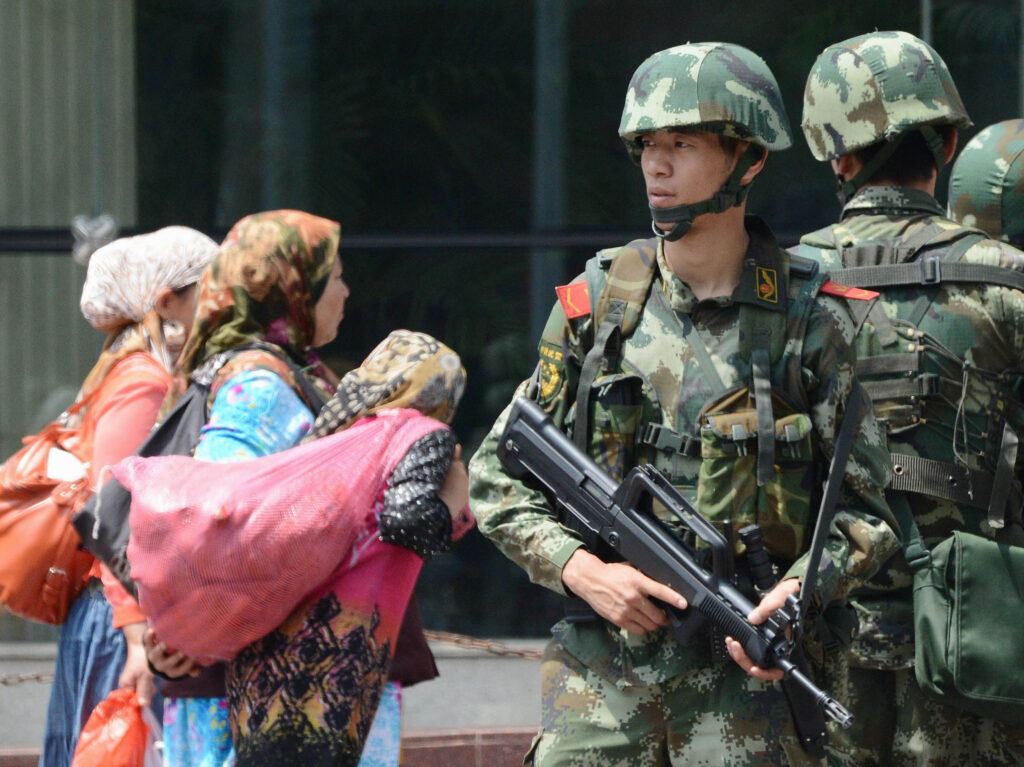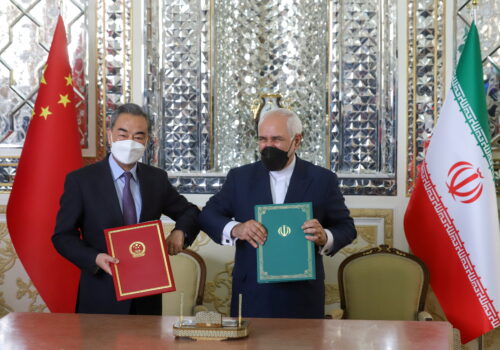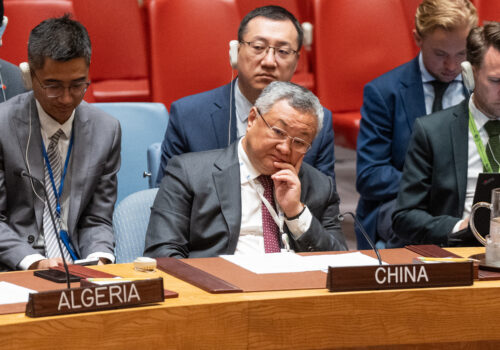In July, al-Tazkirah media—an Islamic State of Iraq and al-Sham (ISIS)-affiliated media organization—distributed an online poster calling for Uyghur Muslims to join ISIS and destroy China’s “empire of tyranny.” The ISIS push to specifically recruit Uyghurs underscores its burgeoning alliance with Uyghur jihadi groups such as the Turkestan Islamic Party (TIP; also known as the East Turkestan Islamic Movement)—and likely presents a security threat to China and its interests in Central Asia.
Beyond this most recent poster, ISIS-Khorasan (ISIS-K; ISIS’ affiliate based in Afghanistan) has actively worked to recruit TIP fighters, including by increasing its Uyghur-language propaganda, offering economic incentives for TIP members to join ISIS-K, and encouraging its followers to attack Chinese targets. ISIS-K’s recruitment efforts and propaganda targeting Uyghurs have already proven effective. In January, ISIS-K killed a Chinese national at a mine in Afghanistan (which was reportedly a joint attack with the TIP). ISIS-K members also conducted a shooting in late 2022 at a hotel in Kabul popular with Chinese travelers, and in 2021 an ISIS-K fighter using the kunya “al-Uyghuri” attacked Shia Muslims in Kunduz.
The Uyghurs, a Turkic ethnic group which generally practices Islam and speaks a language related to Kazakh, face systemic oppression and human-rights violations from the Chinese government. China’s atrocities against Uyghurs, who primarily live in the Western Chinese province of Xinjiang, include forced labor, religious persecution, separation of families, and mass surveillance. The United Nations describes China’s campaign against the Uyghur minority as “crimes against humanity,” as Chinese policies are aimed at destroying the Uyghur language and culture.

Beijing, for its part, views the majority of Uyghurs as a security threat following several small-scale attacks by the TIP in the early 2000s, and it claims that its harsh measures in Xinjiang are meant to eradicate terrorism.
The TIP is a jihadi group primarily composed of Uyghurs from the Western Chinese province of Xinjiang; estimates of its size range from 1,500 to four-thousand fighters. Beijing’s oppressive policies against the Uyghurs underpins and helps to fuel their goal of establishing an Islamic Uyghur separatist state in Turkestan, in northern central Asia—including parts of China’s Xinjiang Province. Although the TIP has not yet made any territorial claims to establish Islamic Turkestan, its attacks against Chinese interests in Afghanistan demonstrate its capabilities and intent to pose an ongoing threat to China. These attacks drive the cycle in which Bejing paints all Uyghurs as terrorists then cracks down on Muslims in Xinjiang, providing TIP with leverage to generate propaganda and continue attacks.
Furthermore, the TIP has longstanding links to al-Qaeda, with its former leader serving on al-Qaeda’s Shura council during the 2010’s. This alliance, underpinned by a shared Salafi ideology and commitment to violent jihad, ultimately led to a brigade of about 2,000 Uyghur TIP members fighting alongside Hayat Tahrir al-Sham (HTS), al-Qaeda’s affiliate in northern Syria, in the Idlib province during the Syrian Civil War.
Although the TIP aligned with al-Qaeda after ISIS and al-Qaeda split in 2014, ISIS is currently targeting the group for recruitment and partnership, likely as part of a broader recruitment campaign. ISIS-K is recruiting from multiple disaffected groups across Central Asia and Afghanistan, including Tajiks, disillusioned former Taliban fighters, and other ethnic minorities to bolster its capability to conduct external operations. To date, ISIS-K’s recruitment efforts targeting minorities have been successful, as evidenced by the arrests of Tajiks and other Central Asians for their 2023 involvement in several attack plots against soft targets in Europe. To maintain cohesion amongst these disparate groups, ISIS-K portrays itself as the sole protector and promulgator of Salafi Islam, routinely promoting its views of a global caliphate. ISIS-K’s narrative of protecting Islam, establishing a global caliphate, and killing all takfiris (infidels), including the Chinese, is a key narrative in its current push to attract Uyghur recruits.
There are two key drivers for ISIS-K’s drive to recruit TIP members and Uyghur jihadis more broadly: first, it pragmatically seeks to expand its ranks with experienced fighters from Syria. Even though the recent recruitment poster was broadly aimed at all Uyghur Muslims, it is likely that ISIS seeks to capitalize on the flow of Uyghur jihadis from Syria. The TIP brigade that fought alongside HTS in Northwest Syria is now facing pressure from the new Syrian government to leave the country. As recently as last December, reports indicate that TIP representatives held discussions with the Taliban about transferring Uyghur foreign fighters to Afghanistan from Syria, leveraging al-Qaeda’s (and by extension, the TIP’s) historical ties to the Taliban. This group of fighters represents a prime recruitment opportunity for ISIS-K: the TIP’s experience fighting in some of the most intense battles of the Syrian Civil War could provide ISIS-K with battlefield proficiency, which many of its other, younger recruits lack.
Although the TIP has historically aligned with al-Qaeda, TIP’s new alignment with ISIS-K is driven by changes in the global terrorist environment. Its expulsion from Syria, al-Qaeda’s diminishing influence, and ideological overlap are all factors that may nudge the TIP to expand cooperation with ISIS-K. ISIS-K has established itself as an effective jihadiorganization with a worldwide reach, which regularly substantiates its calls to violence against takfiris and positions it to attract currently-unemployed jihadis from other groups. Ideologically, the TIP’s narrow focus of incorporating China’s Xinijang Province into Islamic Turkestan meshes with ISIS-K’s goal of developing a global caliphate and presents an area of overlap that ISIS-K can leverage to recruit TIP fighters. Should ISIS-K and the TIP formally align, the establishment of Islamic Turkestan under an alliance with ISIS-K could expand the caliphate into Central Asia.
SIGN UP FOR THIS WEEK IN THE MIDEAST NEWSLETTER
Second, ISIS-K is well-positioned to capitalize on the Taliban’s recent turn against the TIP. The Taliban seeks to court Chinese investments in Afghanistan, but China views the TIP’s presence in Afghanistan as a threat to its interests—and has pressured the Taliban to crack down on Uyghur militants. The TIP’s presence in Afghanistan has been detrimental to the Taliban’s relationship with China; for example, in February, the UN reported that the TIP maintains a presence in Badakhshan, a mountainous province bordering China that has long been a hotbed of terrorism. Since 2001, a wide variety of terror groups have established training camps in Badakhshan, including ISIS-aligned militants, allowing the province to become a critical location for cross-training among terrorist organizations. China had previously pressured the Taliban to remove the TIP from Badakhshan, but the Taliban’s spotty counterterrorism record—along with ISIS-K’s entrenchment in the province—indicates that the Uyghur group is sharing territory with, and likely building ties to ISIS-K. As the Taliban cracks down on its former ally, the TIP, ISIS-K’s burgeoning recruitment efforts indicate it is primed to bring TIP fighters into the fold to expand its own ranks.
The burgeoning ISIS-K/TIP partnership is likely to further threaten Chinese interests. As China continues to expand its investments in Afghanistan, including a recent promise to develop the Belt and Road Initiative there, Chinese workers and representatives are likely to face attacks from both TIP and ISIS-K members. China’s repeated human rights violations against Uyghurs in Xinjiang fuel the TIP’s anger and provide ISIS-K with propaganda material to continue to recruit disaffected Uyghurs and TIP members alike. Finally, as China pressures the Taliban to crack down on the TIP, those fighters may join forces with ISIS-K, which has taken up the cause of Islamic militancy against China—continuing to drive the cycle of violence.
Morgan Tadych is an open-source intelligence professional, Army veteran, and Atlantic Council Counterterrorism Project member. She spent much of her military career researching strategic Eurasia issues and deployed to conduct counterterrorism missions, and is currently pursuing a graduate degree in the field.
Further reading
Fri, Aug 29, 2025
Is the cautious China-Iran military cooperation at a turning point?
MENASource By Jean-Loup Samaan
With a new war between Iran and Israel still an immediate threat, China might need to ask itself: Is cooperation with Iran worth risking its diplomacy model in the Gulf?
Wed, Jul 23, 2025
Iran, China, Russia, and the collapse of deterrence in the Red Sea
MENASource By
Multiple powers now patrol with different mandates, different rules, and increasingly different interpretations of acceptable behavior.
Tue, Aug 5, 2025
Did the Israel-Iran war expose China’s Middle East policy?
MENASource By
The region’s importance in Beijing’s foreign policy is limited and, thus, not much energy and resources are invested in long-term planning.
Image: A frame from a video purportedly from the Turkistan Islamic Party (TIP), taken from the Internet, shows a man speaks in front of a black banner carrying the words in Arabic: "There is no God other than Allah, Mohammad is the messenger of God". A little known Islamist group has threatened attacks against the Olympic Games in China and urged Muslims to keep away from any activities linked to its events, two U.S.-based terrorism monitoring firms said on Thursday. REUTERS/Handout



